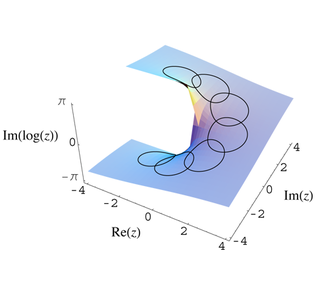

In complex analysis, the monodromy theorem is an important result about analytic continuation of a complex-analytic function to a larger set. The idea is that one can extend a complex-analytic function (from here on called simply analytic function) along curves starting in the original domain of the function and ending in the larger set. A potential problem of this analytic continuation along a curve strategy is there are usually many curves which end up at the same point in the larger set. The monodromy theorem gives sufficient conditions for analytic continuation to give the same value at a given point regardless of the curve used to get there, so that the resulting extended analytic function is well-defined and single-valued.
Before stating this theorem it is necessary to define analytic continuation along a curve and study its properties.
